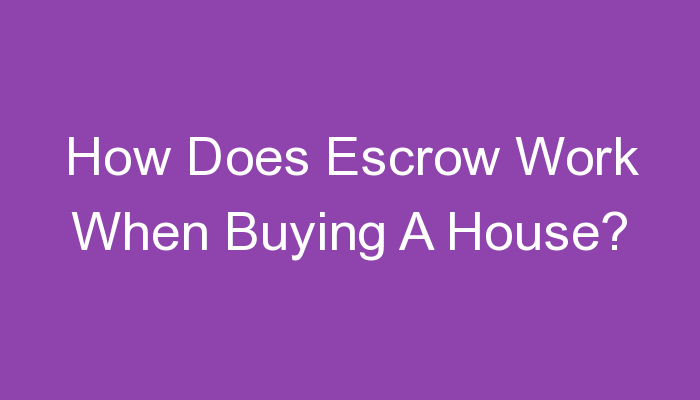Are you looking to purchase a new home? The process can be both exciting and daunting, especially if it’s your first time. One of the crucial steps to purchasing a property is understanding escrow. What is escrow and how does it work when buying a house? In this blog post, we will answer these questions and discuss more details about what an escrow account is and how it can help protect you as a potential buyer. Read on to learn more!
What is escrow?
An escrow account is set up by a third party during the home-buying process. This account holds funds that are used to pay for the home, taxes, and other associated expenses. The buyer deposits money into the account throughout the course of the sale, and the funds are then disbursed once the sale is complete.
An escrow service is typically used when buying a house in order to protect both the buyer and the seller. By using an escrow account, both parties can be sure that all funds will be handled in a professional and timely manner. Escrow services can also help to coordinate other aspects of the home-buying process, such as inspections and repairs.
How does escrow work when buying a house?
When you buy a house, you typically have to put down a deposit, or what’s called “earnest money.” Once the deposit is received, the escrow company holds onto it until closing.
The purpose of escrow is to protect both the buyer and seller. For example, let’s say you put down a deposit on a house, but then something happens and you can’t get a loan. The seller would be out the money for your deposit, so escrow protects them by holding onto that money until everything is finalized.
Similarly, if something happens to the property after you’ve put down your deposit (say there’s water damage), escrow protects you by ensuring that the repairs are made before you close on the property.
Once everything is finalized and all of the paperwork is in order, the funds in escrow are released and used to pay for things like the down payment, closing costs, and any other agreed-upon expenses.
If there’s money left over in escrow after everything has been paid for, it will be refunded to you at closing.
The pros and cons of using escrow
When you buy a house, there are a lot of different things that have to happen in order for the sale to be finalized. One of the most important aspects of this process is escrow. Escrow is when a third party holds onto something of value (usually money) during a transaction. This ensures that both the buyer and the seller are protected in case something goes wrong.
There are both pros and cons to using escrow when buying a house. On the plus side, it protects both parties involved in the transaction. If the buyer backs out or doesn’t pay, the seller still gets their money. And if the seller doesn’t follow through on their end of the deal, the buyer can get their money back. Escrow also helps to speed up the process since all of the paperwork and money are handled by a neutral third party.
On the downside, using escrow can add an extra layer of complexity to an already complicated process. And if something does go wrong, it can take longer to sort everything out since you’re dealing with a third party. Additionally, there are usually fees associated with using an escrow service, which can add to the overall cost of buying a house.
Overall, whether or not you use escrow when buying a house is up to you and your specific situation. Be sure to weigh the pros and cons carefully before making a decision.
Conclusion
Escrow is an important part of the real estate transaction that helps to ensure a smooth and secure purchase process. Although escrow can seem like a complicated and confusing process, understanding how it works will help you make smart decisions when buying or selling your home. By familiarizing yourself with escrow procedures, you’ll be better prepared to handle any potential issues that may arise during the homebuying journey.

